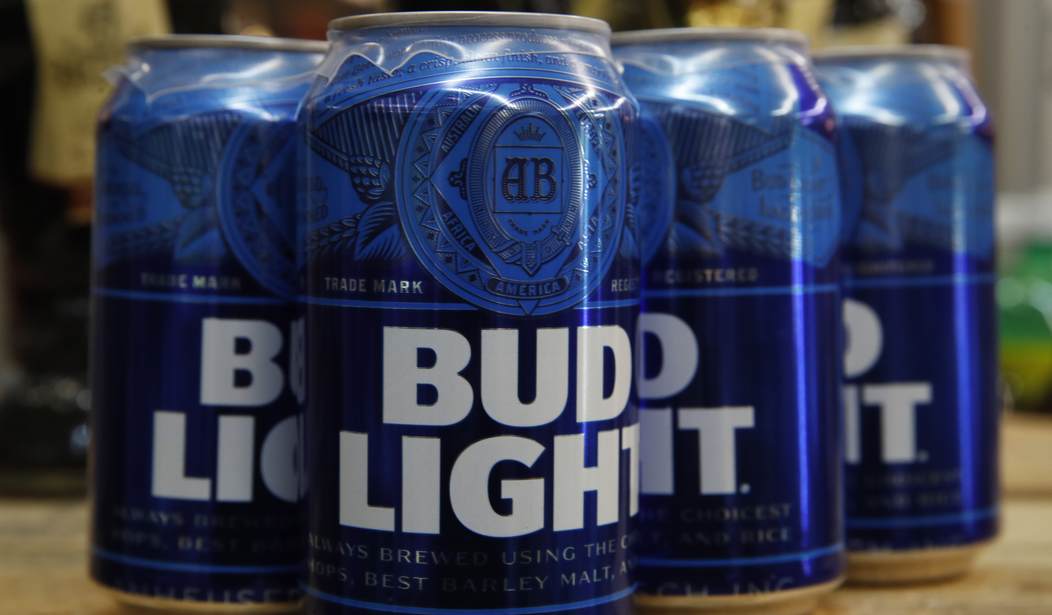Few beer cans have made news like Bud Light’s limited edition containers featuring trans TikTok influencer Dylan Mulvaney. After Mulvaney revealed a collaboration with Bud Light earlier this month, conservative Bud Light fans voiced their displeasure through their words and their wallets. While some media voices claim the backlash may actually be good for business, thus far it has only led to a declining stock price and weak sales. It’s unlikely that parent company Anheuser-Busch was playing 4D chess. Rather, all public evidence suggests that woke concerns have detached Anheuser-Busch from its own audience. This will continue to happen with major companies as long as Diversity, Equity, and Inclusion (DEI) and Environmental, Social, Governance (ESG) concerns continue to play an outsized role in corporate decisions.
Alissa Heinerscheid, Vice President of Marketing for Bud Light, pushed the change, believing the brand’s “fratty, kind of out-of-touch humor” would hold it back with future generations. Instead, “inclusivity” would make the brand “lighter and brighter and different” and appeal to women as well as men.
Think again, Alissa. It’s hard to imagine a beer brand lighter than Bud Light, but if “different” is really her goal, maybe Anheuser-Busch should launch a new product instead of tinkering with one that doesn’t need any fixing. Future generations are still going to have frats. Is it really worth alienating your current buyers to attract a new market? “Fratty humor” has worked so far for a brand that has been producing the most popular beer in America for years.
But the sense of humor of the target audience isn’t really the point. Ms. Heinerscheid’s all-too-common viewpoint that successful brands appealing to their traditional audiences are out-of-touch is itself a ludicrously out-of-touch view.
A study by UCLA Law estimates that 0.5% of U.S. adults identify as trans. While there are no numbers on how many trans people will only drink beer endorsed by one particular trans TikToker, it’s not out-of-touch to assume that it isn’t very high. Meanwhile, a 2022 Pew Research study found that 60% of Americans — up 4% since 2021 — endorsed the notion that gender is determined by biological sex, even as most reject poor treatment of transgender-identifying people. Even if this leaves 40% willing to accept much of the gender agenda, it’s hard to imagine these outnumber people potentially put off by the collaboration given Mulvaney’s juvenile antics, like playing with Barbie dolls, dressing up as fictional six-year-old Eloise, or modeling anatomically unnecessary sports bras.
Recommended
It doesn’t matter what beer Mulvaney drinks, but Anheuser-Busch’s partnership with the trans influencer is tone-deaf given its core consumer base.
Anheuser-Busch CEO Brendan Whitworth’s recent semi-apology on the matter tacitly acknowledges the misstep, playing up the company’s “proud history supporting our communities, military, first responders, sports fans and hard-working Americans everywhere.”
Social media content creators cosplaying vapid female stereotypes were conspicuously absent from this list.
Whitworth lauds “freedom, hard work, and respect for one another” as America’s founding values, and claims to be focused on “protecting our remarkable history and heritage.” It’s easier to imagine these tropes playing well with conservative Americans rather than young TikTokers looking for trans-affirming content.
This was a dumb move, especially since the minds behind the brand could have leaned into a key factor that would have alienated neither existing customers nor future generations: affordability. Were they afraid that Bud Light’s reputation as one of the most inexpensive drinkable beers — which has worked so well with longtime fans of the brand — would be somehow unappealing to notoriously frugal Gen Z consumers? What could be more inclusive than an affordable beer as prices continue to rise at alarming rates?
Since the partnership went public at the start of the month, Anheuser-Busch has lost $3 billion in value as of the stock market’s close on April 17. Though sales numbers are not yet available, the Bud Light brand has likely taken a large part of that hit. What could have convinced Anheuser-Busch to make such a poor business move? The answer has to do with ESG, which purports (incorrectly) to mitigate portfolio risk by taking progressive stances on social issues.
Many have pointed to concern with DEI ratings, such as the Human Rights Campaign’s Corporate Equality Index, as the true impetus behind the partnership, and this may be true. These are often a consideration when investment firms create ESG scores for their portfolios, creating perverse incentives for companies to appease groups like the Human Rights Campaign out of fear for their stock prices. The proliferation of ESG among asset management firms will promote more cases like this. As inclusivity becomes prioritized as a “social” risk factor in ESG models, more bad business decisions will be made to appease ESG-screening asset managers. And as woke universities deliver graduates with increasingly weak hard skills to marketing departments, companies will rely more on out-of-touch ESG rubrics and less on solid consumer research and data analysis.
“Inclusivity”-driven business decisions here caused a major blowback, and we should hope Anheuser-Busch learns from its mistake. But the laundry list of similar missteps by major American companies suggests this process may require more time and effort than expected. Most critically, this problem won’t go away as long as ESG “social risk” factors are considered core criteria for business or investment decisions – even when they hurt the bottom line.
Mike Viola is the head of analytics at the Foundation for Economic Education (FEE) and a Young Voices contributor. He previously worked in investment research for five years. You can find him on Twitter @mf_viola.

























Join the conversation as a VIP Member